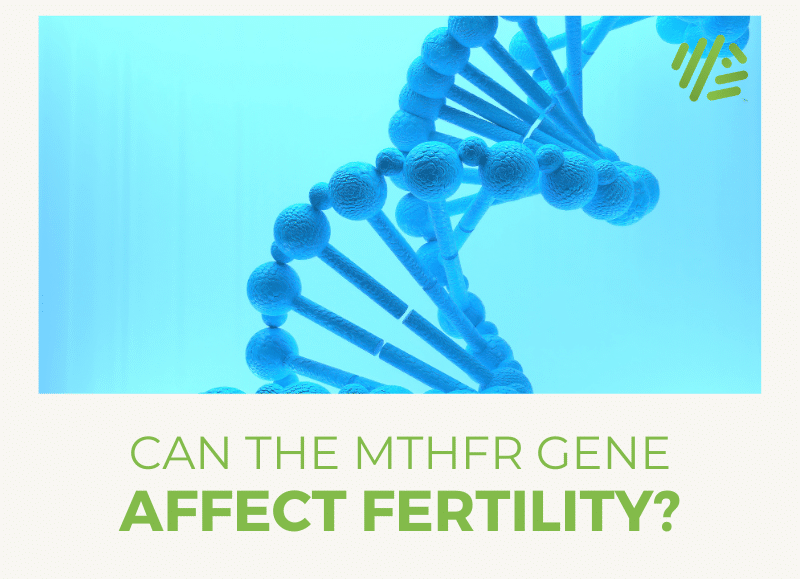Can the MTHFR Gene Affect Fertility?
Genes Mentioned

Contents
By now, you’ve probably heard about the MTHFR gene. In this post, I will discuss how MTHFR “mutations” may disrupt normal processes, such as fertility. MTHFR can have an impact on health, however, many sites writing about genetics overstate the impact.
The majority of the population possess some of these variants, experiencing very little to no side effects at all, and still reproducing along the way.
To gain further insight, read our evidence-based blogs to learn more about “MTHFR symptoms” or why you don’t need to follow an MTHFR diet.
The genotyping giant, 23andme has also been publicly critical of the claim that the MTHFR variants directly impact health outcomes in a major way, and has taken the position that the issue has been, for the most part, overblown.
Before we dive deeper into the fertility issue specifically, we’ll begin with a brief, uncomplicated introduction to the various genetic variations of the MTHFR gene that exist and how they affect the proper functioning of the gene and its related protein.
MTHFR 101
MTHFR is a gene (5-methyltetrahydrofolate) that breaks-down folic acid into folate via an enzyme called methylenetetrahydrofolate reductase, which plays a crucial role in processing amino acids, the building blocks of proteins.
The MTHFR gene is located on chromosome 1 and we inherit two copies of the gene: one from each parent. When there is some variation in DNA sequencing, the result is a “mutation” often referred to by scientists as single nucleotide polymorphisms (“SNPs”). The SNPs in the MTHFR gene decrease enzyme activity, i.e. function, which in turn affects several biochemical processes.
There are many MTHFR variants identified to date, however, the two most studied variants are:
- 677C>T (C667T or rs1801133)
- 1298A>C (A1298C or rs1801131).
The C677T allele is the most studied variant and about 50% of the population may have 1 copy – which makes them heterozygous, while up to 25% may have inherited two copies which makes them homozygous. 1
The frequency of the C677T SNP varies significantly between ethnic populations. It is found to be more common among Italians, Hispanics, and Asians than in Caucasians and Africans. The A1298C SNP is not studied as extensively as C677T hence the population frequency is not well documented. 1
In those who have MTHFR SNPs, folic acid can have the tendency to accumulate rather than be converted into the methyl folate the body can use.
So, how does this affect fertility?
MTHFR and Fertility
Having been shown to reduce the risk of neural tube defects, folic acid has been proven time and time again as an essential nutrient for the healthy development of fetuses.
Those with reduced MTHFR activity may not be able to convert folic acid into a bioactive form the body can use, which is why there has been an ongoing conversation about MTHFR and pregnancy. In other words, you can take all the folic acid you want, but if you can’t metabolize, or break it down properly (i.e. you have one of the variants), you can’t reap the benefits of folic acid supplementation, which may pose a problem in your fertility or pregnancy journey.
We wrote recently about a new study that demonstrated that variants in the MTHFR gene can affect folate levels during pregnancy.
Note: The CDC still recommends taking folic acid, and not methylfolate, regardless of MTHFR status.
Conditions linked to MTHFR
While MTHFR has been linked by some alternative medical sources to a wide range of conditions, the weight of the scientific evidence links reduced MTHFR function to these conditions:
- Hyperhomocysteinemia (elevated homocysteine),
- Increased birth defects risk
- Miscarriage
- Preeclampsia
Research regarding miscarriages shows that:2
- Women who are homozygote (two copies) for C667T, have nearly double the risk of miscarriage.
- Women who are heterozygote (1 copy) or homozygote for A1298C, had an increased risk of miscarriage by 59%.3
Research regarding IVF treatment show that:3
- Individuals that are homozygous for C667T have double the risk of having recurrent implantation failure during IVF.
- These individuals also have 20% fewer eggs during IVF.
- Heterozygous or homozygous for A1298C showed a higher risk of premature ovarian failure (POF).
See also: B vitamin supplements and cancer risk
MTHFR, folate, and infertility
Women of childbearing age, pregnant women, as well as individuals with MTHFR polymorphisms are the main populations at risk for folate deficiency. Folate supplementation is widely used to improve fertility, to prevent embryonal neural tube defects (NTDs) during pregnancy, and is essential for keeping homocysteine levels normal.
When reviewing your supplements and lifestyle for infertility, this gene matters most commonly when deciding between taking folic acid or folate. Folate (vitamin B9) is naturally occurring in foods whereas folic acid is synthetic.
So, if you or your partner have two C677T variants of a gene or a C677T and an A1298C variant, you may have elevated homocysteine levels in your blood. When the MTHFR gene is not functioning properly (due to the variants), it will not convert homocysteine into methionine, and you will have elevated homocysteine levels. Because of this, you will not metabolize folic acid to folate, leading to a deficiency in folate.
In this case, methylfolate supplementation is your best option, as opposed to folic acid.
What does the research say?
In a prospective cohort study of 232 women, live birth rates in women undergoing IVF were 20 % higher among women who took the highest amount of folate (>800 mcg/day) compared to women taking the lowest amount (<400 mcg/day). This study also found that folate supplementation was superior to dietary folate.4
Similarly, a prospective cohort study of women undergoing IVF in the Netherlands found that a doubling in the follicular folate level was associated with a three-fold increase in pregnancy.5
From this data and others, women who possess the MTHFR variants (or not), should be advised to take 800 mcg/day of folate during fertility treatments and throughout pregnancy.
MTHFR variations and male infertility
It is estimated that the causes of nearly 30–40% of male infertility cannot be identified and this kind of infertility is called idiopathic.6 Genetic elements have been gaining traction, and once again, the link between MTHFR gene variants and male fertility parameters has become significant.
In a study looking at 280 men with impaired spermatogenesis (abnormal sperm development), they found a significantly higher frequency of TC or TT genotypes in C677T polymorphisms in individuals with abnormal sperm. Researchers also observed that vitamin B9 and B12 intake decreased total homocysteine and improved semen parameters among the men with the T allele of MTHFR C677T polymorphism.
Take home message
Infertility within a couple can be addressed once the MTHFR status of both parties has been identified. From there, steps can be taken to either enhance the diet with more natural folate, supplement with a high-quality folate supplement, or both.
Ensure that you are supplementing with the correct dosage, following your healthcare practitioner’s advice.
For more, see this piece on whether mothers with MTHFR SNPs should be supplementing with folic acid.



